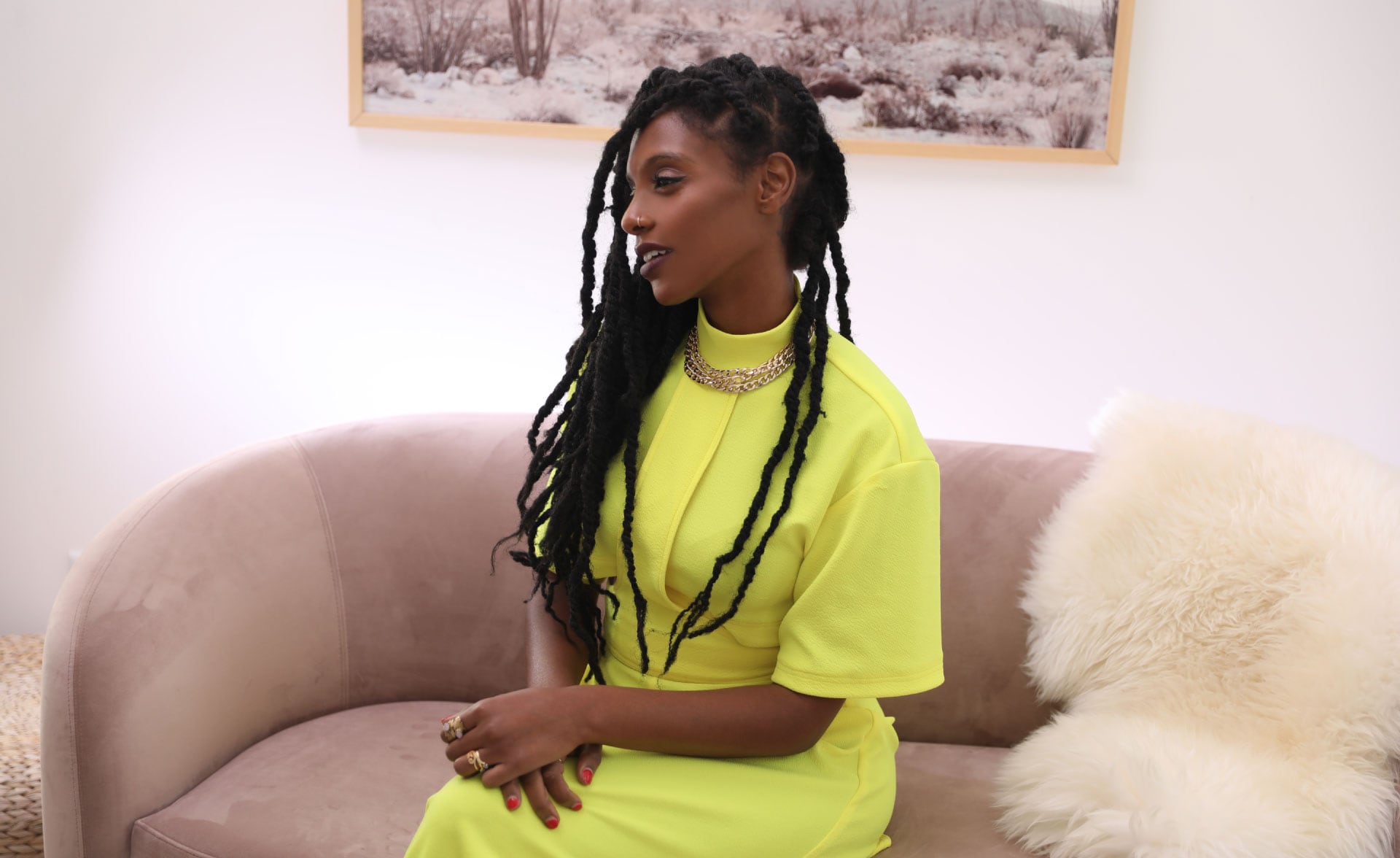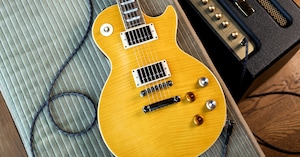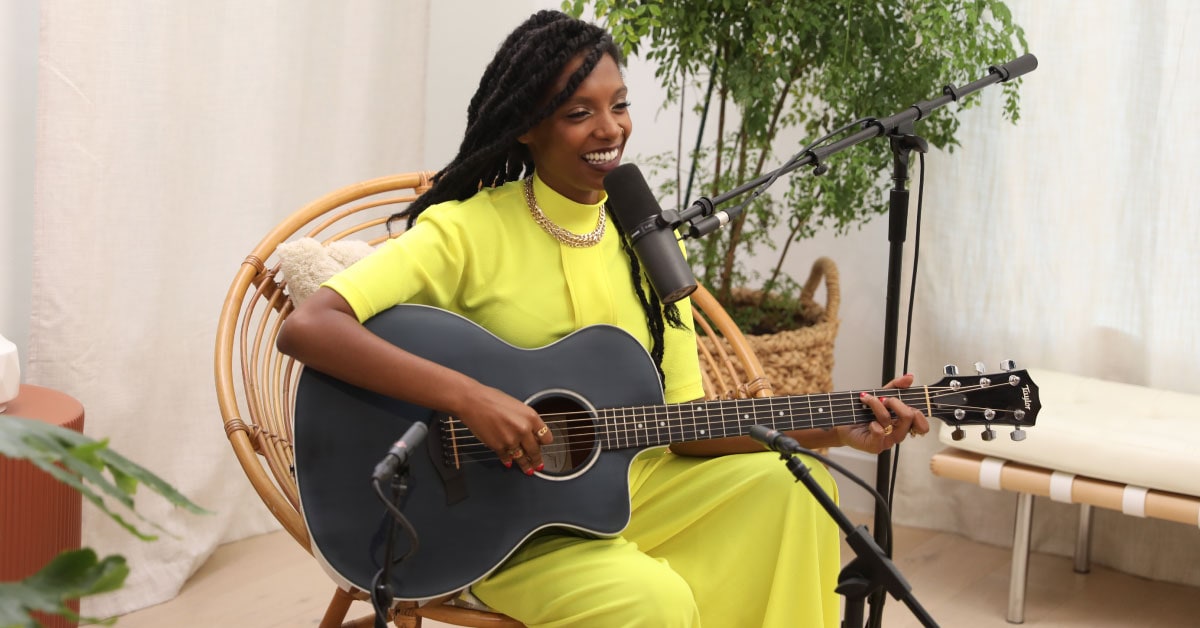With her unique blend of folk, rap and R&B, Mereba has carved out her sound by blending and bending traditional musical genres to her will. Delivering every word with deep soulfulness, the singer and guitarist is an authentic storyteller, communicating her life experiences with impactful lyrics. In her collaborations with artists like 6LACK, J.I.D, EARTHGANG and more, Mereba brings her unique perspective to every verse. We sat with the creative powerhouse to discuss how she developed her sound, the inspiration she finds in her community, and how music is healing.
What is the foundation of the Mereba sound?
I love playing with rhythm as a producer, and I love balance to the way that I deliver vocally. It’s weaving rapping and singing together. The folk and country element is important to me, too, so classic folk melodies mixed with current rap and soulful lyrics. If I’m talking about something that is universal, I want to say it in a way that is my unique perspective on the subject.
My favorite guitar that I’d take on the road is my hollowbody Gretsch guitar. It has a really warm sound, and that guitar introduced to me what sound I like the most. I was never a guitar head—I just played the guitars that were gifted to me, because for a long time I couldn't afford a nice guitar. But that was the first guitar that I was like, “This goes with the style of music that I make.” Since I’ve gotten that guitar, I’ve never played a show without [it].
How did you develop your clear, rhythmic vocal delivery?
When I was young, I was into the diva singers—Whitney Houston, Mariah Carey, Toni Braxton, Celine Dion, people who were belting—and that's how I sang. As I got older, I realized belting is not my thing. I can do it, but I had to step back from emulating people and listen to myself and what I felt comfortable doing. A more understated approach to singing let my lyrics and my stories be the focal point.
In choir, my teachers would encourage me to sing that belt-y style. A lot of times I was in white spaces, and I felt like I was the token belt girl. I dealt with that for a long time, even in Black spaces—people being like, “Just be like people who have come before you.” I want singing to be fun, so I developed my style based around it being fun for me to sing. Now, I feel like people are more open to a Black woman singing in a way that's not what we’ve heard before.
How has your sound and production style changed over the years?
My debut EP, Room For Living, was folk. There were very few drums on it. I went back to Ethiopia, where my dad’s side [is] from, and they were like, “Where are the drums? Where are the things that people dance to?” I remember the flight back, I was thinking about it, and I was like, “My music’s cool, but it’s not the full scope of who I am.”
I downloaded Ableton, and got some drum packs and drum loops from my producer friends. My friends were all excited I was going to produce because they lowkey been nagging me to start doing that for a long time. My friend, 6LACK, used to be like, “Where are your beats? I want to see one of your beats.”
That's how I start songs now—I make a drum loop that I like, then I start adding the guitar over it. The pocket that you fit into is so different when you have drums versus when you're just strumming chords. That's one of my favorite parts now, making the drum pattern.
Who first inspired you to want to create music?
My aunt got me the movie, “The Wiz.” It was perfect for a kid, because it was very theatrical and fun, but the music was dope. Quincy Jones is the producer of the music, and I would just sing that all the time around the house. My same aunt introduced me to Whitney Houston. Her voice, the way she emoted when she sang, was like—I couldn't put it into words. I didn’t know what was happening. I want[ed] to learn how to sing and stir up emotions like that.
Lauryn Hill [is] literally one of the best rappers of all time. André 3000 captured that uniqueness that I’m really into. Outkast—I was obsessed with them. Black Thought spoke about very real things, very of-the-world, of-the-hood, real-life stuff that I felt needed to be said. My brother introduced me to Jay-Z when he was making underground mix tapes, before he came out with Reasonable Doubt. They were the ones that made me want to rap about real stuff.
My brother would show me all sorts of stuff from grunge to rap music, underground type of stuff. That's when I started gravitating towards the guitar. I started loving folk music when I was in high school, mixing rapping in with that, and it started forming this sound that I still have. It came from this desire to be unique, and to make music into my voice.
What essential gear have you been using for your upcoming project?
The very beginning of stuff [was] my voice notes on my iPhone. Because I've been at home [during quarantine], I wasn’t inspired to sit and work on music, so a lot of the ideas [came] when I was cooking, or when I was reading a book. I always would have my phone with me, and I would sing ideas into it. I took it back to writing songs on the guitar, and that gave me a chance to emotionally release what I was feeling.
I just got my first Fender Telecaster. My co-producer, Sam, who’s a masterful guitar player, we started doing Zoom lessons. I’ve been playing guitar for a long time, [but] I was in a comfort zone, and he opened up a lot for me. Then June rolled around. All the protests and everything was too much. But that's what I’ve been doing this year, just playing my Fender and writing songs like that. Around August, I took those ideas and translated them with drums and all the other stuff at the studio. I love synths—I love using the Prophet, and there's a lot of cool synths, like a Jupiter, there. They have an actual piano, so I could get back into playing piano with my limited skills. I just beefed up the songs, but they come from that place of solitude, processing my feelings and living at home for the first time in a few years.
My next project doesn’t have any features—it’s just me—but it spans a wide range of feelings that I’ve had this year. It’s bringing me back to the realest that it could possibly get.

Tell us about the music community in Atlanta and the Dreamville Crew.
I met EARTHGANG when I was in college. They went to Hampton. I went to Spelman. They were from Atlanta. I was from North Carolina. But we just connected. They introduced me to J.I.D. He’s quiet at first, and the first time he rapped, I was like, “That's what you've been hiding behind not talking?” India Shawn is an amazing artist, too, and she was my ride or die. All of us were a crew. If I had a song that I needed a verse on, one of them would rap on it. If they had a song they needed a chorus on, I would sing on it.
It’s really cool being able to release an album with them [this year] under Spillage Village, our collective. It’s great to have that to come back to, because it reminds me of home, of that time in my life when music was about the fun and the freedom. We were all so broke, and we were all scraping together to get a meal. We were just doing it for the right reasons. I think that it grounds us that we’re all still close, because we remind each other of that, of that energy
The Jungle Is the Only Way Out is your debut album. What did releasing it mean to you?
I went through a really intense period of life, from losing a parent to financial instability, almost being homeless. Music had to become that healing mechanism for survival’s sake. It was more serious than it had ever been for me. Then, I met my manager, and I was introduced to my A&R through one of my friends from Atlanta. But I didn’t make the songs with that knowledge at all. I was making them in my apartment. Sometimes I would go to my car and record vocals, until I lost my car. I think I was being tested, like, “If you feel you have this purpose on Earth, and you want to tell your unique story, then you're going to have to live your unique story.” People [who] have heard the album and connect with it can feel that urgency, because that's what it was made out of in the realest way.
Music made me feel like there was a space that I could carve out for myself that made me feel better, made me feel understood, and it gave my life purpose.
How does music help us heal and connect?
Music [has] a simplicity to it, and you don’t have to do much to access it. You can disconnect from the things that are going on that you can’t control. I like to listen to music that's about the world—like Stevie Wonder, Nina Simone or Bob Dylan—artists that talk about times that they’re living in. It’s relatable and comforting to hear artists who are speaking honestly about how they feel, getting into the nitty-gritty [of] what it’s like to be a human during a war, or during a pandemic or during unrest.
You can put [music] on, and all of a sudden you're connected to millions of other people who also find relief and joy from this thing. That's one thing that we can all agree on: music is dope. It’s universal in that sense, and I think we need things that are universal and positive that connect us.
Keep up with Mereba at her official website and Instagram.




